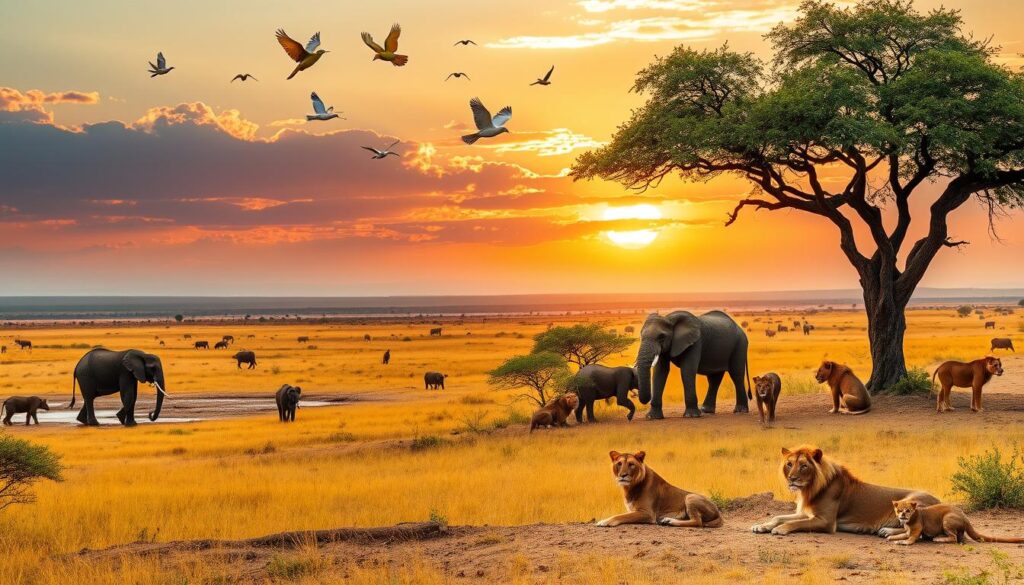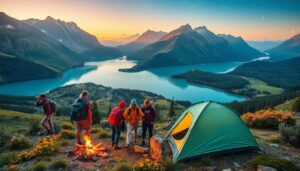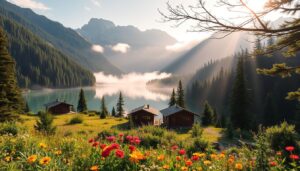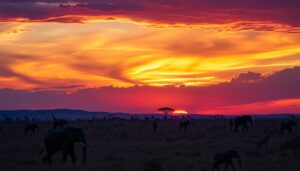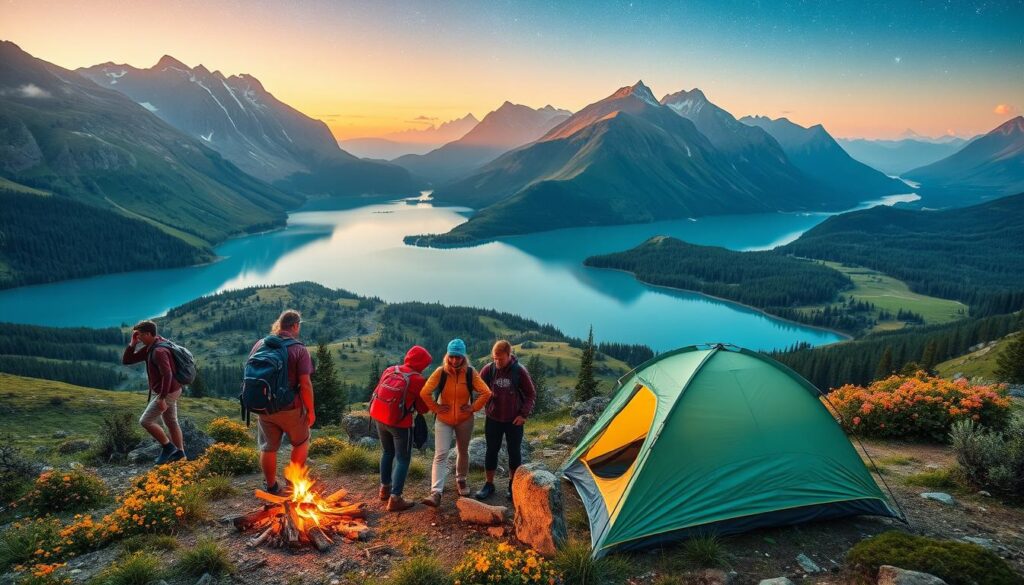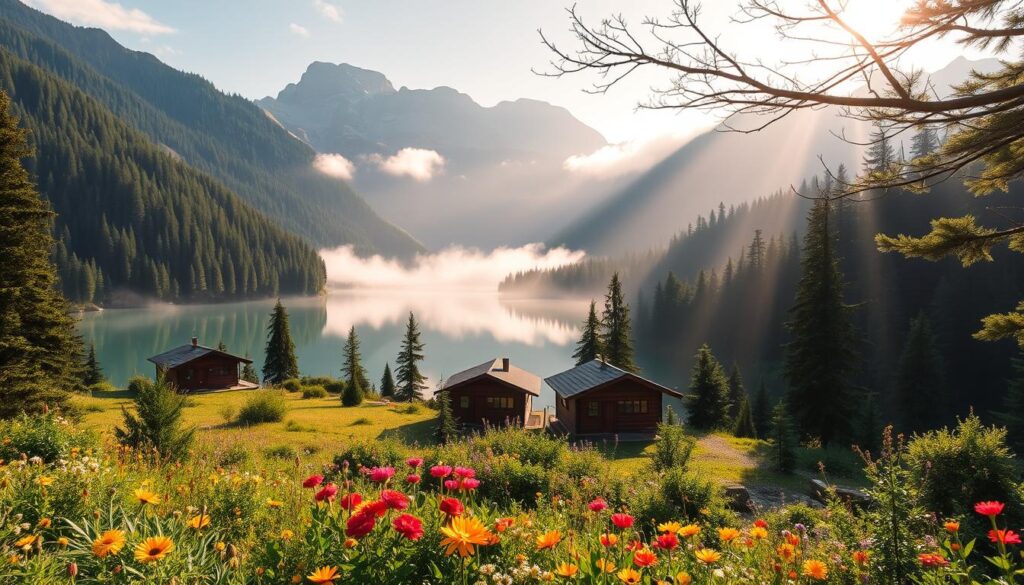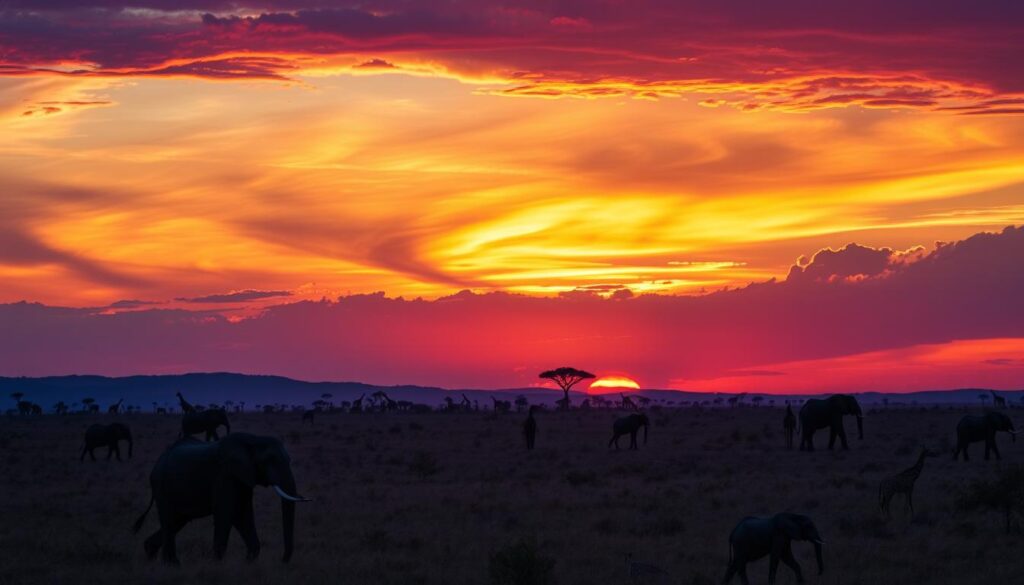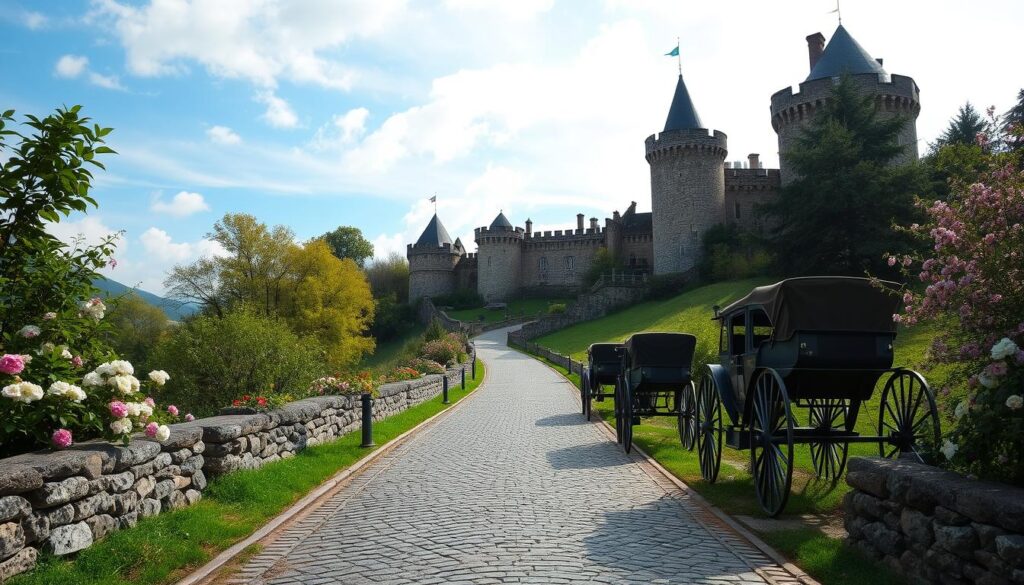Wildlife Adventure Safaris give you a unique way to connect with nature. If you love breathtaking landscapes or thrilling encounters with exotic animals, these safaris are for you. They offer memorable experiences in nature.
As eco-tourism grows, joining wildlife safaris helps our planet. It shows how important it is to protect diverse ecosystems. Get ready for a journey that will make you appreciate nature and see wildlife up close.
Key Takeaways
- Wildlife Adventure Safaris offer an immersive way to observe exotic animals.
- Eco-tourism promotes conservation while enhancing travel experiences.
- These safaris are suitable for adventure travel enthusiasts and nature lovers alike.
- Expect memorable nature experiences that connect you to diverse landscapes.
- Planning is essential for maximizing your safari adventure.
Introduction to Wildlife Adventure Safaris
Embarking on a wildlife adventure safari offers travelers an amazing chance to connect with nature. These experiences let participants dive into the heart of unique ecosystems. They enjoy exciting outdoor adventures and learn about conservation.
Travelers will see a range of species, like tall giraffes, big elephants, sneaky leopards, and large groups of wildebeest. Each moment teaches travelers about nature's complex ways. Most safaris happen in protected areas, which helps save different species.
Seeing wildlife in their natural homes gives people a strong love for these world wonders. The excitement of seeing exotic animals up close makes the journey memorable. It brings people closer to the wild.
| Type of Safari | Features | Best Time for Wildlife Observation |
|---|---|---|
| Classic Safari | Guided tours in open vehicles | Dry season for better visibility |
| Walking Safari | Close encounters with wildlife | Mornings or late afternoons |
| Camping Safari | Immersive outdoor experience | Dawn and dusk for activity |
What to Expect on Your Safari
Embarking on a safari is an exhilarating adventure. It combines excitement with a deep connection to nature. Understanding the different types of safaris will make your adventure better. Each type has its own charm and meets various interests for a personalized journey.
Understanding Safari Types
There are many safari types, each offering unique experiences. Highlights include:
- Game drives: These are done in vehicles for a broad view of wildlife, perfect for photography.
- Walking safaris: They offer a close connection with nature on foot, teaching about animals and tracking.
- Photography safaris: Designed for photographers, focusing on capturing wildlife in their natural settings.
The Ideal Wildlife Viewing Times
The best times for safaris are key for seeing wildlife. Early mornings and late afternoons work best because it's cooler. This is when many animals are more active. Seasonal changes also impact animal behavior. For example, migration or mating seasons bring unique animal actions. The dry season drives animals to water sources, offering great viewing chances.
Tips for First-Time Safari Goers
Tips for first-timers can make your safari unforgettable. Some key advice includes:
- Practice safari etiquette: Be quiet and keep a respectful distance from animals.
- Learn what to bring on safari: Don't forget your binoculars, sunscreen, and a good camera.
- Talk to expert guides to learn more about animal behavior and the surroundings.
Knowing about various safari types and using these tips can greatly improve your adventure. You'll make memorable moments in the wild.
Wildlife Adventure Safaris: A Closer Look
Going on a wildlife adventure safari is a unique experience. It lets you connect with nature and helps in conservation efforts. It involves tracking exotic animals and understanding how conservation protects wildlife habitats.
Tracking Exotic Animals
Tracking animals is an exciting part of wildlife safaris. Guides use different techniques to find and identify animals by their tracks, droppings, and behavior. This method makes the safari more thrilling. Travelers help look for hard-to-find animals. It turns each trip into an adventure.
Learning about the ecosystem shows visitors the importance of conservation. It makes their trip more meaningful and connects them more to conservation efforts.
Conservation Efforts and Their Importance
Conservation is key to wildlife safaris. Safari operators aim for sustainable tourism. This supports local communities and saves ecosystems. Being part of these efforts makes a traveler's experience richer. Their visit has a big impact on conservation.
Joining anti-poaching actions, funding projects, and saving habitats teaches responsibility. It builds a strong link between travelers and conservation. This creates meaningful memories and ensures wildlife is safe for future generations.
![]()
| Focus Area | Details | Conservation Impact |
|---|---|---|
| Animal Tracking | Utilization of tracks and signs to identify species. | Improves understanding of habitat health. |
| Wildlife Guides | Trained professionals sharing knowledge. | Enhances visitor experience while promoting wildlife protection. |
| Sustainable Tourism | Practices supporting eco-friendly travel. | Helps fund local conservation initiatives. |
Choosing the Right Safari Destination
Finding the perfect safari spot is crucial for a trip you'll never forget. There are many choices out there, each with its own beauty. This ranges from breathtaking views to a wide range of animals. Popular places like the Serengeti and Kruger National Park are famous for their wildlife and beautiful settings. What you like to see, whether it's large animals or unique birds, will help decide where to go.
Top Locations for Wildlife Adventure Safaris
Here are some of the best places for wildlife safaris:
- Serengeti National Park (Tanzania) – Famous for the Great Migration.
- Kruger National Park (South Africa) – Home to the Big Five.
- Maasai Mara (Kenya) – Known for its abundant wildlife and dramatic landscapes.
- Etosha National Park (Namibia) – Unique salt pans and diverse species.
- Chobe National Park (Botswana) – Renowned for its elephant population.
Factors to Consider When Selecting a Destination
Choosing a safari spot means looking at several important factors. Here are some key points to think about:
- Weather Considerations – The weather can affect how many animals you'll see, with dry seasons often being better.
- Budget for Safari – Some might prefer fancy hotels, but there are also cheaper options like camping.
- Accessibility – It's important to look at how far the travel is and what tours are available.
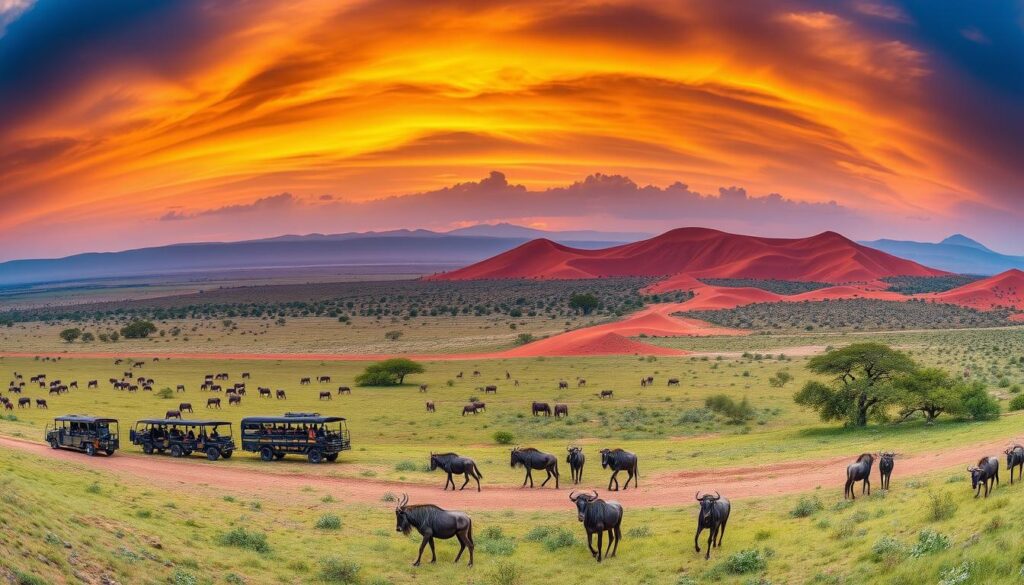
Preparing for Your Wildlife Adventure Safari
Getting ready for a wildlife safari is key to a memorable trip. It's important to have the right stuff, from clothes to health items. Your pack list should include things that keep you safe and comfortable out there.
Essential Gear and Packing List
Your safari pack list should have things that make your trip better but stay useful. Wear light clothes that keep you cool, in colors that don't stand out in the wild. Here's what you should not forget:
- Wide-brimmed hat for sun protection
- Sunscreen with high SPF
- Insect repellent to ward off bugs
- Quality binoculars for wildlife observation
- Camera with a zoom lens for capturing unforgettable moments
- Portable charging devices for keeping electronics powered
- Small first-aid kit for minor medical needs
With these key items, you're all set for the amazing adventures ahead.
Health and Safety Guidelines for Travelers
Keeping healthy on safari is crucial. Before going, talk to a doctor about vaccines you might need. Vaccinations for diseases like yellow fever and typhoid are important. Make sure to discuss how to stay healthy on your journey.
Knowing how to stay safe on safari is just as key. Learn the do's and don'ts, especially around wild animals. Being aware of your surroundings helps keep you safe, so you can enjoy your trip.
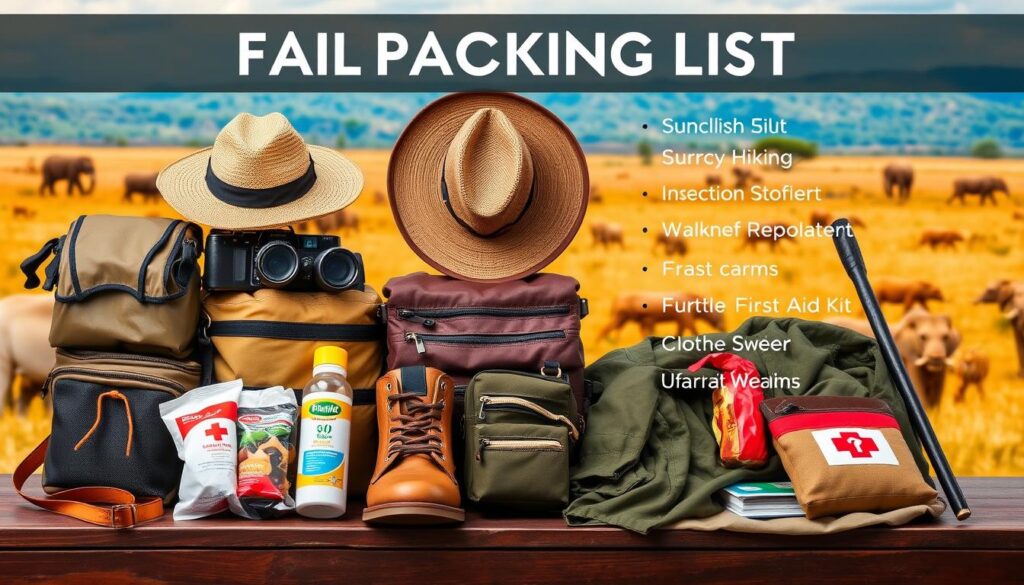
Conclusion
Wildlife Adventure Safaris offer an unmatched chance to dive into stunning landscapes and see various animals up close. They mix excitement with learning. This helps guests appreciate nature's beauty and the importance of saving it. Each trip is filled with unique stories and amazing meetings.
Adventurers who explore the world's most special ecosystems not only make memories but also learn to value these places. It's important to remember that visiting safaris helps conservation efforts. This ensures future generations can enjoy these amazing sights too.
Going on a wildlife safari means more than just a journey. It's a crucial action for promoting a healthier planet and caring for our environment. By taking part in these trips, travelers protect nature. They also make a positive difference in communities and the lives of animals.
